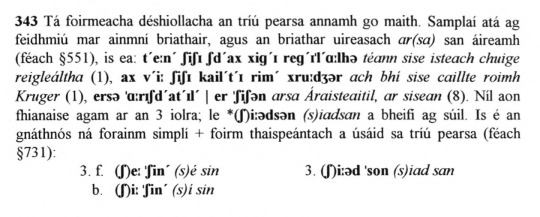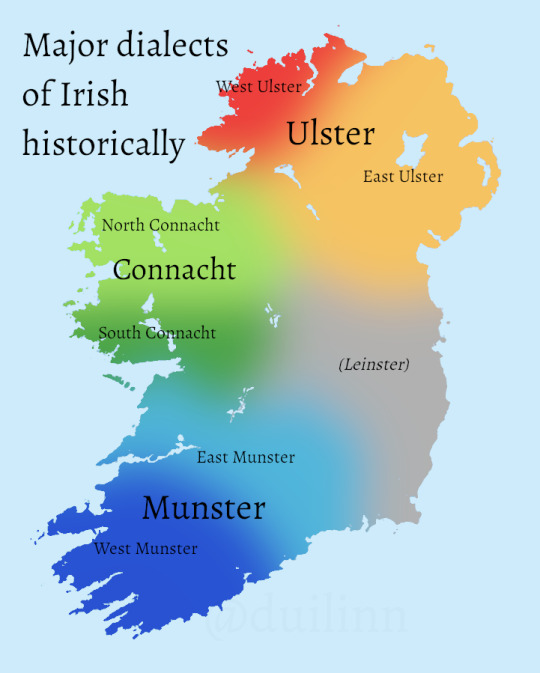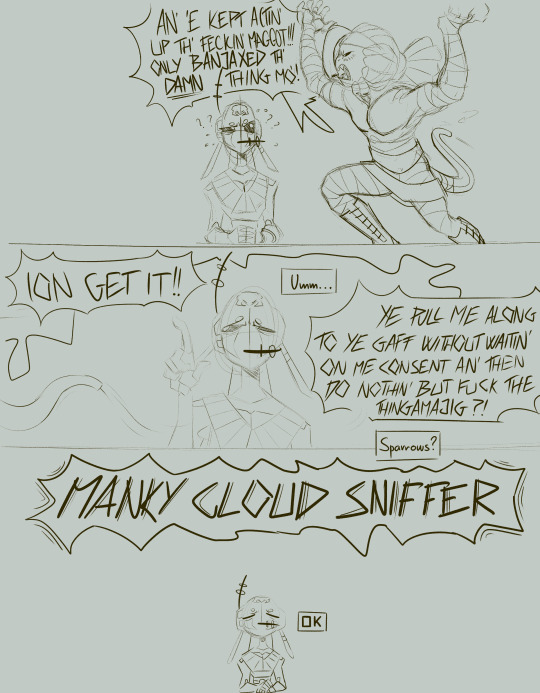#Irish dialects
Text
Just spent a minute trying to find a source for this to make sure I wasn't crazy (and I wasn't!)
So I thought I would share, since lots of people might not be aware. In Kerry Irish, the emphatic pronouns (s)eisean, (s)ise, and (s)iadsan are generally replaced by the demonstrative forms (s)é sin, (s)í sin, and (s)iad san. Literally "that" (masculine), "that" (feminine) and "those".
So instead of having "Rinne seisean é" - "He did it", you would have "Dhein sé sin é"
And that's just another neat dialectal quirk!
PS if you're confused about san, it has the same meaning as sin, but in Munster you usually only use sin after slender sounds.
PPS if you're wondering what the difference between (s)iadsan and (s)iad san is, there's two things. 1. is the stress, first syllable versus second syllable. And the 2. is the vowel, the first has a schwa (since it's unstressed) and the second usually has an o or a u vowel, it's just written like san for historic reasons.
PPPS source: Gaeilge Chorca Dhuibhne by Diarmuid Ó Sé

#gaeilge#irish language#gaelainn#learning irish#irish dialects#munster irish#kerry irish#gaelainn na mumhan
72 notes
·
View notes
Note
Why do irish people sometimes talk with yoda grammar?
We have to make sure we get our point across, so we do.
An actual answer, I think it's a holdover from the Irish language in certain dialects. I'll look into it because somehow I've never thought about it!
Related, my childminder knew a lad who was quoted, upon finding that someone had eaten his small lunch, as saying the line "who ate my banana who?"
66 notes
·
View notes
Photo

Historical distribution of Irish dialects.
by dublin2001
This is a rough guide as to the main historical dialects in Irish. Roughly this corresponds to 3 out of the 4 provinces of Ireland - Ulster, Connacht and Munster. Each of these is split in two, this seems to be the most common thing done in Irish linguistics.
I marked most of Leinster in grey (those parts that didn't speak Ulster or Munster Irish), this doesn't mean that it never spoke Irish, but that it is not usually included in classifications of dialects as Irish became extinct there first.
This map doesn't include more local details such as Ulster influence in parts of County Mayo, or the current Irish speaking areas in County Meath (or indeed "Connemara" or "West Kerry" - those are all historically part of much larger dialect groups). I previously made a pointlessly detailed map of Irish dialects a number of years ago, but I wanted something much simpler and less prone to errors.
This map only deals with the choice of dialect for a given area, and doesn't mean that the area in question spoke only Irish.
320 notes
·
View notes
Text
Also I realize that the answer is probably just reading enough period sources but as a linguist I really do need to pick Patrick O'Brian's brain about where in the world he got his different speech patterns from
#mostly just fascinated because they are mostly not based on modern speech patterns#and maximum respect to him for that period pieces should be in period language and that includes different sociolects/dialects#but i'm just really really interested what he took them from. like i want to read the source material#also as someone who knows virtually nothing about irish english i didn't notice most of stephen's irish speech patterns#until after reading the golden ocean which makes them much more obvious#but i'm curious if (1) they're recognizably modern and/or period irish and (2) what the irish people here think of them#generally inclined to trust him on it because it's unexpected enough that i feel like it's probably at least slightly based on sources#i just have no frame of reference for it#anyways when i say that i need to talk to patrick o'brian you have to understand that this would be minimum 50% of the conversation#the other 50% would be asking him about the catalan references because i am nothing if not predictable#perce rambles#aubreyad
56 notes
·
View notes
Text
Bless your heart. No - really
It seems to be understood, at least through the southern US, that "bless his/her/your heart" is a thinly veiled insult. However, when I was growing up, technically southern, my mother always used it more literally. F'rinstance, if I took her flowers she might say "Oh, bless your heart" and would 100% mean it. Based on that example, I use it the same way. I've wondered a little about that, since I realized how other people mean it.
Anyhow. I posted a scan of a letter from my great grandmother (daughter of Irish immigrants on both sides) to my grandmother dated 1944. At the end of that she refers to a Valentine's card that my very young mother had sent to her, and added "Bless her heart." Clearly meaning it sincerely. It made me wonder if the southern Bless-your-heart met up with the Irish diaspora tendency to use the term 'Bless' frequently and literally and created a little coal-mining-town pocket of folks who say it when they're truly delighted with someone or something.
Just pondering. Anyone else out there use B-y-h in a positive, loving way? Is Bless-your-heart George's Creek* an outlier that should not be counted?
'* George's Creek follows a major Appalachian coal seam and has lots of tiny, defunct mining towns.
71 notes
·
View notes
Text
This evil giant Garuidh was a lot more intimidating before I realised that the modern Irish pronunciation of his name was "Gary".
#toruigheacht gruaidhe griansholus#i apologise to everyone at the ICCS who gets to hear my wildly inconsistent pronunciations of irish#it is fully a lucky dip in terms of century and dialect in this paper#irish#gaeilge
98 notes
·
View notes
Text
"Saol trí mhíol mhór saol iomaire amháin, saol trí iomaire saol an domhain.
“Three times the life of a whale is the lifespan of a growing ridge, and three times the life of a growing ridge is the lifespan of the world.”
These thirteen words encapsulate just how far back the knowledge contained within the language stretches on this island, as a whale was thought to live for one thousand years, (although they actually live for about a century), so it was known that the cultivation ridges we can see in the fields around us could be up to three thousand years old. Archaeologists agree that there are indeed ridges of that age still visible in places like the Céide Fields in Co Mayo or Slievemore on Achill Island. The span of three cultivation ridges would amount to 9,000 years, which brings us to the date that archaeologists believe humans first arrived here – the beginning of our world. The fact that our people appear to have somehow kept a count of how long we have been on this island and that they encoded it in our language is precious.
My grandmother often pointed out the still-visible cultivation ridges left by her great-grandparents’ generation during the Great Hunger in the 1840s. Some were more visible than others as they had been left undug – with my ancestors either too weak to dig them, or, having noticed the blight-rotted potato stems, they realised there would be nothing but a slimy mush beneath the soil. I had been struck by the longevity of such memories, but it wasn’t until I heard the proverb that I realised quite how far back these folk memories actually stretch.
It appears, at least, as though we managed to keep some wispy thread of memory intact from our Neolithic forebears, who planted, weeded and harvested along these ridges thousands of years ago. The knowledge is contained within the land, and over the years I’ve realised the best way of accessing it is through the language."
-Manchán Magan, 'Thirty-Two Words for Field'
#gaeilge#irish#ireland#history#linguistics#manchán magan#thirty-two words for field#never read the book so i dunno if its shite or not but i love that seanfhocal and i wasnt bothered writing out my own explanation for it#when his is a) better and b) the first thing on google when you search up that seanfhocal#was at an irish language event a few days ago and felt very embarrassed by my lack of comprehension#so ive been trying harder to connect with and learn gaeilge#although to be fair everyone at the event was speaking a different dialect than i speak so like
91 notes
·
View notes
Text

#ireland#newfoundland#meme#Did you know Newfoundland had a large irish diaspora and its own now extinct dialect of the irish language?
16 notes
·
View notes
Note
wouldn't it be funny if pretty much everyone in Euros' city heard Sparrows talk using regional slangs and going "what the FUCK is she saying"
it Would, but unfortunately that got beaten out of her pretty hard back in the Desaevio school, so at this point Sparrows knows how to watch her language around high circles. it actually makes her kind of weird back home! her siblings got a good shock when she came back home and spoke to them for the first time in six years and it was with northern accent and very High Circle Like gjksljlcdskl
However Euros himself is NOT spared

#spot says stuff#rw#oc tag#the whole fam is in deep with irish/english slang cuz of inkling n granpa </3 n then sometimes a сука n курва comes around ofc#n then in the off string au post-MA Euros randomly starts cursing in her home districts/familys dialect n slang n she ends up cryin#euros: some thick MANKY eejit gods feckin'- | sparrows: -gasps with watery eyes puts away her mask n makes out with him-
46 notes
·
View notes
Text
as someone who had to learn phonetics and ipa during acting class i LOVE whenever phil talks about his education
#educate the masses about where sounds are placed!!#tell the girls about fricatives and plosives!!#teach about diphthongs and triphthongs#petition for phil to talk about his education more bc i’m so intrigued#me learning to write my name in the phonetic alphabet#if ur curious i had to learn how to speak without any regional indicators and then learn three dialects using ipa as a guide#we learned american southern and standard english and irish#i sucked at irish btw#sorry to my ancestors#dan and phil#phil lester
20 notes
·
View notes
Text
Gale: info dumping about arcana, the Weave, theories, literature, and recipes. random mentions of Tara
Talara: 😍
Talara: info dumping about history, folk lore, and how there's this one dialect of elvish that is lost to time because no one bothered preserving the pronunciation
Gale: 😍
Everyone else: Please shut the fuck up
#gale of waterdeep#baldur's gate 3#bg3#gale dekarios#they're autistic your honor#info dumping is a love language#please in this day and age of recordings and such if you speak or know someone who speaks a regional dialect (esp if it's dying) preserve i#we lost entire dialects of irish because of various factors including the lack of preservation#we have lost native languages for similar reasons#dont let language die#dont let folk art die#preserve your history
31 notes
·
View notes
Text
What is the d' in d'ól?
The d´ in d'ól (drank), d'fhág (left), d'ith (ate) and so on, is a contraction of the past/conditional particle do. You may be wondering why you don't see the particle before other verbs, and in fact, it's still used sometimes before consonants in munster, so you get things like do bhíos ann (I was there), do bhí fear ann fadó... (long ago there was a man...)
It's not used before consonants really in the other dialects or in the standard, so why is that? Basically it's because the effect it causes (lenition) makes the past tense clear anyway, and it was an unstressed particle, so it's easy to skip over in speech, so in most places "do bhí" just became "bhí".
But in the case of vowels, because it doesn't add another syllable, it was preserved.
If you look at older texts (around the 1900s even) you'll often see do written constantly.
17 notes
·
View notes
Text
i've spent a devastating amount on irish-language books this week and somebody needs to stop me. casually dropping €14 on a slim paperback without a second thought simply because it's as gaeilge is not an attitude that leads to a healthy bank account
#bought a second translation of an prionsa beag because it's a different translator and this one's from gaoth dobhair#and i was hoping therefore it might be gaoth dobhair dialect#also bought a book by that translator and it's def ulster af#it says madadh in the first paragraph#love to read the ulster irish books#the Narnia translations are my faves for this reason. very ulster. girseach and gasúr all over the place
30 notes
·
View notes
Text
there are many things i am a fan of joey batey in the witcher for and being the first person to more or less correctly pronounce a welsh word is now one of them
#the witcher#i admit i'm not an expert on the welsh language but i do know <dd> is pronounced like <th> as in ''this'' or ''then''#so 'gwynbleidd' is not 'gwin-bleyd' but 'gwin-bleyth'#('blaidd' is 'wolf' apparently anyway)#it's just been irking me#celtic languages have been used sporadically throughout the series (every once in a while an irish or irish-like word will show up)#and almost zero times have they been pronounced correctly#so this stood out to me :)#i also want to give credit to the dialect coach who is helping with the elvish language direction#but it was definitely 'bleyd' earlier#whether that was on the particular actor speaking or the director i have no idea#i'm down a language rabbit hole the elder speech language is all i care about now i want to see documentation for it#how close it is to welsh? maybe this is time for me to learn welsh
43 notes
·
View notes
Text
me writing this new chapter:
'Jake ached to look under the bonnet--' damn nope that's british dialect. 'Jake ached to look under the hood.'
'The pubs didn't sell alcohol yet--' nope that's irish slang. 'The bars didn't sell alcohol yet.'
really struggling here guys XD
#writers on tumblr#lottie writes fanfic#ftnadol#irish and british sides having to go with american dialect because jake's character is american#even though i have not succumbed to the american spelling#because it's colour guys not color--
14 notes
·
View notes
Text
i downloaded babel to have a nose and do you ever pick up a book and within five minutes you can tell the author is an american who was obsessed with harry potter and is using their literary career as a way to work through the fact that they still love it but they’re not allowed to publicly admit that anymore
#also the footnotes. good lord.#and the scones.#there’s this weird fetishisation of englishness while also doing the absolute maximum to frown bc of all the imperialisms#also very very petty of me i guess but beyond a cursory mention there is not one single mention of irish gaelic welsh manx cornish etc. in#a novel about how the imposition of english is an act of colonial violence. set in england. in the 1830s. HELLO?????#also as far as i can tell no discussion of dialects in english etc. and despite being very well researched it’s written in terminally#online graduate student speak
10 notes
·
View notes